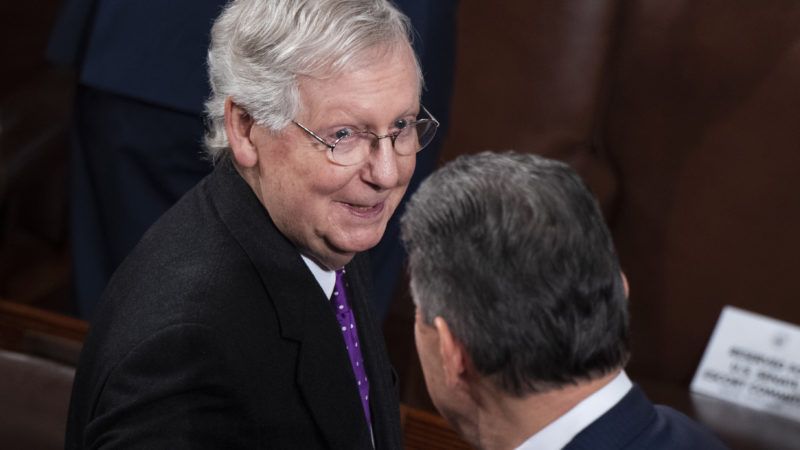Did Republicans Buy the Argument That Impeachment Requires a Crime?
While some senators seemed to endorse that misbegotten claim, others explicitly rejected it.

To no one's surprise, the Republican-controlled Senate voted today against removing President Donald Trump from office based on the articles of impeachment approved by the Democrat-controlled House in December. Many Republican senators have said that Trump's conduct vis-à-vis Ukraine, even if "inappropriate," did not rise to the level of an impeachable offense. But some have gone further by seeming to endorse the dangerous, ahistorical argument, advanced by Trump's lawyers, that impeachment requires a criminal violation—or at least "criminal-like behavior," as Alan Dershowitz put it while defending the president. Other Republican senators, meanwhile, have explicitly rejected that claim, which would preclude impeachment of presidents who violate the public trust without violating the law. Here is a rundown of relevant public statements by Republican senators.
Roy Blunt (R–Mo.)
"Alan Dershowitz said it was not [impeachable], and I don't disagree with that," Blunt told The Washington Post on January 28.
Mike Braun (R–Ind.)
"Let's say it's true, OK?" Braun said in a January 28 interview with the Post, referring to the allegations against Trump. "Dershowitz last night explained that if you're looking at it from a constitutional point of view, that that is not something that is impeachable."
Bill Cassidy (R–La.)
"The Constitution speaks of 'treason, bribery, or other high crimes and misdemeanors,'" Cassidy said on the Senate floor yesterday. "Because high crime and misdemeanors are not specifically defined, it is reasonable to assume that the Framers meant for impeachment to occur only if a crime approached levels as severe as treason and bribery."
Susan Collins (R–Maine)
"I do not believe that the conviction of a president requires a criminal act," Collins said on the Senate floor yesterday.
John Cornyn (R–Texas)
"The Constitution says treason, bribery, high crimes, and misdemeanors," Cornyn said on January 17. "But the House, in its wisdom, decided not even to charge the president with a crime."
Ted Cruz (R–Texas)
"I think it is clear the House managers failed to meet their burden," Cruz told reporters on January 28. "They failed to demonstrate an impeachable offense. They didn't even so much as allege that the president committed a crime. The Constitution requires 'high crimes and misdemeanors.'"
Josh Hawley (R–Mo.)
"Democrats impeach[ed] the President without alleging a single crime," Hawley complained on Twitter in December.
Ron Johnson (R–Wis.)
"When you talk about treason and bribery, or other high crimes and misdemeanors," Johnson told reporters on January 22, "it really implies there has to be some kind of crime based on current law."
John Kennedy (R–La.)
"I think this case is going to come down to the president's intent—his motive," Kennedy said in November on Face the Nation. "Did he have a culpable state of mind?" He conceded that a quid pro quo of military aid for a Ukrainian investigation aimed at discrediting one of Trump's leading political rivals, if proven, "probably" would be impeachable.
Mitch McConnell (R–Ky.)
"I do not subscribe to the legal theory that impeachment requires a violation of a criminal statute," McConnell, the Senate majority leader, said on the Senate floor yesterday.
Rob Portman (R–Ohio)
"There may be circumstances where a crime isn't necessary for a president to be impeached," Portman said in a New York Times op-ed piece published today.
Mitt Romney (Utah)
Romney, the only Republican senator who voted to convict Trump (on the first article of impeachment, alleging abuse of power), clearly rejected Dershowitz's theory. "The historic meaning of the words 'high crimes and misdemeanors,' the writings of the founders, and my own reasoned judgment convince me that a president can indeed commit acts against the public trust that are so egregious that while they're not statutory crimes, they would demand removal from office," he said before his vote. "To maintain that the lack of a codified and comprehensive list of all the outrageous acts that a president might conceivably commit renders Congress powerless to remove such a president defies reason."
Marco Rubio (R–Fla.)
"I reject the argument that 'Abuse of Power' can never constitute grounds for removal unless a crime or a crime-like action is alleged," Rubio wrote in a January 31 Medium post.
Pat Toomey (R–Pa.)
"As you watch these proceedings in the House," Toomey said during a December 6 speech in New York, "there's one question that keeps coming up in my mind. And that is, 'Where is the crime?'" In a press release yesterday, however, Toomey implied that a crime might not be required for impeachment: "While there's debate about the precise meaning of 'other high Crimes and Misdemeanors,' it's clear that impeachable conduct must be comparable to the serious offenses of treason and bribery."
Roger Wicker (R–Miss.)
"I basically am in agreement with the very scholarly approach that Mr. Dershowitz took that there's no article there that's grounds for impeachment and removal," Wicker told CNN on January 28.
Some of these statements are ambiguous. It's not clear, for example, whether Blunt, Braun, and Wicker accepted all of Dershowitz's arguments, or exactly what point Cornyn and Hawley thought they were making by emphasizing that the articles of impeachment did not allege specific crimes. But Cruz and Johnson clearly are promoting the idea that a president can be impeached only if he violates a criminal law. That position may prove inconvenient the next time a Democrat occupies the White House.
[This post has been updated with a quote from Romney's pre-vote speech.]

Show Comments (173)